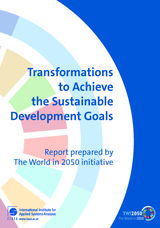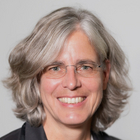
Sustainable development pathways
van Vuuren, Detlef / Elmar Kriegler / Keywan Riahi / Caroline Zimm / Felix Creutzig / Anne Goujon / Arnulf Grubler / Tomoko Hasegawa / David McCollum / Raya Muttarak / Simon Parkinson / Pauline Scheelbeek / Sam Sellers / Ana Paula Aguiar / Avit Bhowmik /External Publications (2018)
in: Elmar Kriegler / Dirk Messner / Nebojsa Nakicenovic / Keywan Riahi / Johan Rockström / Jeffrey Sachs / Sander van der Leeuw / Detlef van Vuuren (eds.), Transformations to achieve the sustainable development goals; Report prepared by The World in 2050 Initiative, Laxenburg: International Institute for Applied Systems Analysis (IIASA), 69-105
Key Messages
- Reaching the full set of Sustainable Development Goals (SDG) by 2030 and continuing on sustainable pathways thereafter requires transformative change in several areas. Given the linkages between the various transformations, an integrated approach is needed. Model-based scenarios can be a useful tool to explore the efforts associated with these transformations as well as to assess possible synergies and trade-offs between them.
- A wide body of literature exists on how goals connected to the environment-related SDGs can be achieved. For the SDGs related to human development, quantitative scenarios are less common, but relevant characteristics can be identified. They emphasize responsible consumption and efficient production, global cooperation, and good governance of the energy-water-land nexus, aided by reduced inequalities. Recently, several studies have started taking a more integrative, backcasting approach.
- Achieving all SDGs will require substantial further improvements of education and healthcare. Education and health are instrumental in enabling people to live a self-determined life, find decent work and generate income to sustain themselves, but also to undertake climate change mitigation and deal with environmental problems. The ambitions go hand-in-hand with the goal to reduce poverty in all its forms and reduce global inequality.
- Consumption and production cut across several of the other transitions, by ensuring an efficient use of resources and providing an ideal entry point for integrated pathway development. Evidence shows that it is possible to considerably reduce demand for resources by taking a more service-oriented approach. This will allow improvement of the overall efficiency of the systems. Changing consumption patterns contribute to achieving sustainability by keeping the size of the system manageable.
- Energy efficiency, increasing the share of renewable energy and carbon capture and storage play a key role in decarbonizing the energy system while providing access to modern energy for all. Achieving the Paris Agreement is still possible but only if combined with focus on a broader set of SDGs. Constraints set by the SDGs require a rapid phase-out of fossil-based power generation: about 100% of electricity will likely need to be produced with zero and low-carbon technologies in 2050. This can only be achieved with a rapid increase in energy efficiency. At the same time, carbon dioxide-removal strategies need to be implemented.
- In 2050, the land-use system will have to produce enough food and biomass to feed about nine billion people, to meet demand for wood, fibers and bioenergy. To limit the food system’s environemntal impacts and to conserve biodiversity, current agriculture area cannot be increased. This requires improving land-use practices, dietary changes toward less meat-intensive diets, and increasing the efficiency of the systems rapidly, reversing the long-term trend of falling yields.
- Integrated pathways for cities are characterized by high connectivity and ‘smartness’. Pathways show that by 2050 around two thirds of human population will live in urban areas, calling for new investments in urban infractructures. Smart city design can be a major factor for limiting future resource demand.
- Digital technologies support the sustainability transition and cut across all the other transformations. Further digitalization and automation can both support and be a threat to achieving the SDGs. It is therefore important to implement forward-looking governance structures that allow to mitigate potential trade-offs of the digital revolution.
- Mobilizing the necessary financial resources will be critical to achieve the transformation towards the SDGs. This above all comprises a fundamental change in the investment portfolio across all sectors of the economy, towards sustainable solutions. It will also imply an increase in investments.
- Further development of model-based scenarios is a key priority. A list of research priorities can be identified, including i) increasing the coverage of SDGs and their interactions, ii) a stronger focus on efforts to achieve a set of SDGs simultaneously, iii) a better representation of the underlying geographic and societal heterogeneity and iv) better reflection of the importance of societal change and governance dimensions. This will require a multi-disciplinary approach in which integrated assessment modeling is combined with the contribution of other scientific disciplines.



